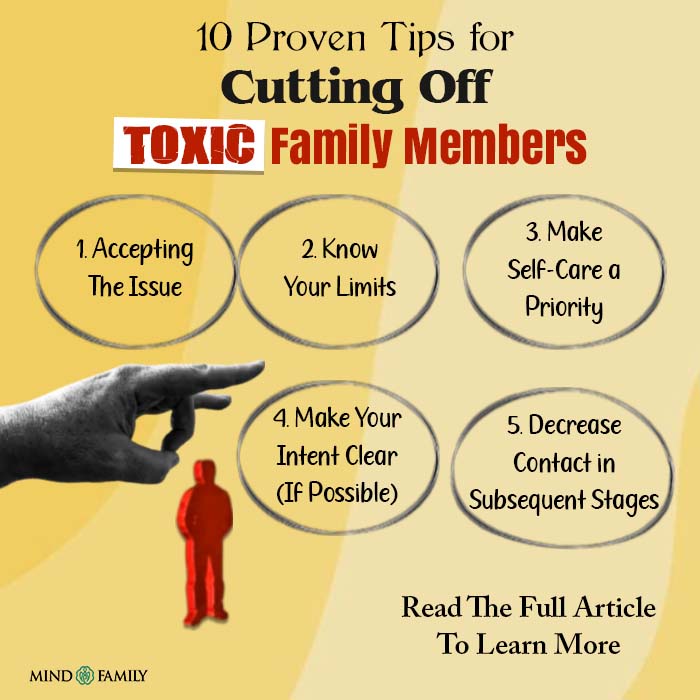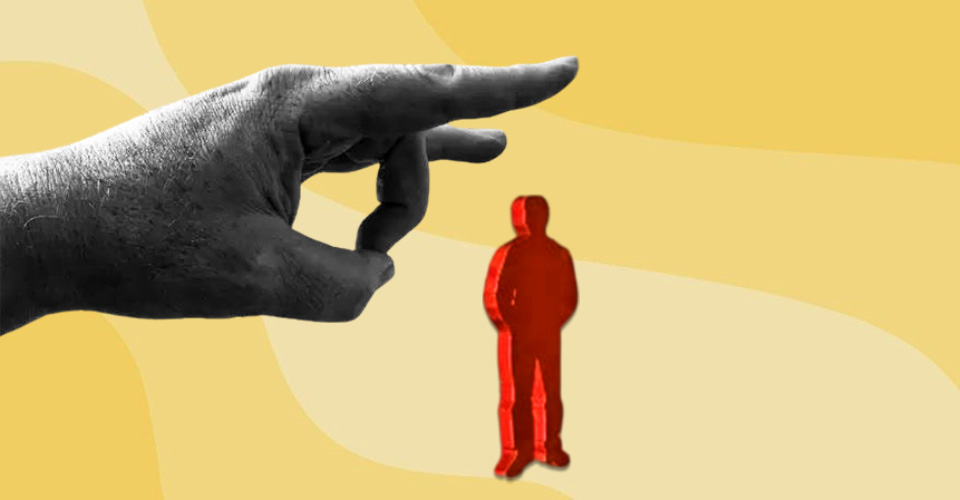Family relationships can be some of the most important and influential connections in our lives. However, not all family bonds are healthy, and sometimes the people closest to us are the ones causing the most harm.
Toxic family members can drain our emotional energy, undermine our self-worth, and create an environment filled with negativity.
While cutting off toxic family members is one of the hardest decisions we can make, it’s often necessary to preserve our mental and emotional well-being.
If you’ve been grappling with the challenges of dealing with toxic family members, you’re not alone. In this article, we’ll walk through 10 helpful tips to navigate the difficult process of distancing yourself from toxic relatives.
10 Helpful Tips For Cutting Off Toxic Family Members

1. Acknowledge The Problem
The first and most important step is to acknowledge that the relationship is toxic. Toxic behavior can take many forms—constant criticism, guilt-tripping, manipulation, or emotional neglect.
It might involve family members who take advantage of your kindness, disrespect your boundaries, or create an environment of negativity. It’s easy to downplay these behaviors, especially when we feel obligated to maintain family ties.
However, unless you acknowledge the toxicity for what it is, you won’t be able to protect yourself. We can only move forward once we accept the reality of the situation. Don’t ignore the signs; your feelings are valid.
2. Set Clear Boundaries
After recognizing the problem, it’s time to set boundaries. Setting boundaries is not about creating conflict or pushing people away—it’s about protecting your peace and mental health. Dealing with toxic family members requires you to communicate your limits with clarity.
For instance, if your toxic family member often calls you at all hours, you can establish a rule that they can only call during specific times, or not at all. If conversations always lead to hurtful arguments, limit the topics you’re willing to discuss.
By standing firm on these boundaries, we show that we value ourselves and our well-being. It’s about reclaiming your emotional space.
Read More: 10 Harmful Excuses To Abuse By Toxic Parents! Watch Out
3. Focus On Self-Care
Cutting off toxic family members can be emotionally draining. That’s why practicing self-care during this time is vital.
You need to nourish your body, mind, and spirit. This could mean taking time to journal your thoughts, engage in physical activities that make you feel strong, or practice meditation to calm your mind. Prioritize activities that make you feel centered and emotionally balanced.
It’s essential to remind yourself that your well-being comes first when dealing with toxic family members. When we take care of ourselves, we strengthen our ability to make decisions that serve our best interests.
Don’t hesitate to indulge in some ‘me time’—you deserve it.
4. Communicate Clearly (If Possible)
While it’s tempting to ghost or silently cut off toxic family members, it can sometimes be more effective to communicate your decision directly. This can help create closure and avoid misunderstandings.
However, this doesn’t mean you owe them a detailed explanation. A simple, straightforward statement like “I need space for my mental health” or “This relationship isn’t working for me” is often enough.
The key is to stay calm and firm, even if they react poorly. Toxic individuals may try to manipulate the conversation or play the victim, but remember, this is about protecting your peace, not engaging in unnecessary drama.
5. Limit Contact Gradually

In some cases, cutting off a toxic family member all at once isn’t possible, especially if you live in the same household or frequently see them at family gatherings. If this is the case, consider reducing contact gradually.
Start by limiting phone calls, texts, or social media interactions. Slowly, you can decrease the amount of time you spend with them in person as well. This gradual process can help ease the transition, giving both you and the toxic family member time to adjust.
Over time when dealing with toxic family members, you’ll notice the emotional weight lifting as you distance yourself from their negative influence.
Read More: 7 Warning Signs Of Toxic Grandparents And How To Deal With Them!
6. Lean On A Support System
Going through the process of cutting off toxic family members can feel incredibly isolating. This is why having a solid support system is crucial. Friends, partners, or even a trusted mentor can provide you with the emotional support you need during this time.
Share your experiences and feelings with people who truly understand you and have your best interests at heart. When we surround ourselves with supportive individuals, we’re less likely to fall into self-doubt or be swayed by guilt.
Remember, you don’t have to go through this alone—lean on your circle of trust for strength and encouragement.
7. Stick To Your Decision
Once you’ve made the decision to cut ties, it’s essential to stand by it. Toxic family members often react to distance with manipulative behaviors like guilt-tripping, playing the victim, or even becoming aggressive.
They may try to convince you to reconsider by appealing to your sense of loyalty or responsibility. In these moments, it’s important to remind yourself why you made this choice in the first place.
Write down the reasons for your decision if it helps you stay grounded when dealing with toxic family members. Sticking to your decision is crucial for maintaining the peace and emotional balance you’ve fought hard to achieve.
8. Accept That It Won’t Be Easy
Cutting off family members is never easy, no matter how toxic they are. You might feel a deep sense of loss, guilt, or even sadness. It’s important to acknowledge these feelings rather than suppress them.
We often grow up believing that family is forever, so when we take a step back from those relationships, it can feel unnatural and wrong, even when it’s the best thing for us.
Understand that healing takes time, and these feelings won’t last forever. Over time, as you experience the peace that comes from letting go of toxicity, you’ll realize that protecting your well-being was worth the pain.
9. Seek Professional Help If Needed
Sometimes, the emotional weight of cutting off toxic family members is too much to bear alone. This is especially true if your family relationships are deeply enmeshed with trauma or long-standing emotional wounds.
Seeking the help of a therapist or counselor can be an incredibly helpful step in your healing process. A professional can provide you with tools to navigate your feelings and help you make sense of the complex emotions you’re experiencing.
Therapy also provides a safe space where we can process grief, anger, or guilt. Don’t be afraid to reach out for help—it’s a sign of strength, not weakness.
10. Look Forward To A Healthier Future
Finally, it’s important to focus on the positive future you’re creating for yourself. Once you’ve cut off the toxic family members, you’ll notice a sense of freedom and relief.
You’ll have more emotional energy to invest in healthy relationships and activities that bring you joy. Without the constant negativity, you’ll be able to thrive and grow as an individual. It’s important to focus on this brighter future and not dwell on the past.
By removing toxic influences from our lives, we make space for healing, happiness, and the relationships that truly nurture us.
Read More: 10 Helpful Tips For Bonding With Family And Strengthen Family Ties
A Word From Mind Family
Cutting off toxic family members is never an easy decision, and we understand how painful and complicated it can be. Family relationships are deeply ingrained in our lives, and stepping away from those bonds often brings up feelings of guilt, doubt, and sadness.
At Mind Family, we believe in the power of self-care, setting boundaries, and fostering relationships that nourish you rather than drain you.
As you navigate this difficult journey, know that you’re not alone. Surround yourself with a supportive network of friends, loved ones, or even professionals who can guide you through the emotional ups and downs. It’s okay to seek help, lean on others, and take time to heal.
Frequently Asked Questions (FAQs)
1. How do I know if a family member is toxic?
Toxic family members exhibit harmful behaviors like manipulation, criticism, guilt-tripping, or disrespecting boundaries, negatively impacting your emotional well-being and self-worth.
2. Is it okay to cut off a family member?
Yes, if the relationship consistently harms your mental and emotional health, cutting off toxic family members is a step toward protecting your well-being.
3. How can I communicate my decision to cut ties?
Keep communication simple and firm, stating your need for space or boundaries for your mental health. Avoid long explanations or engaging in arguments.


Leave a Reply